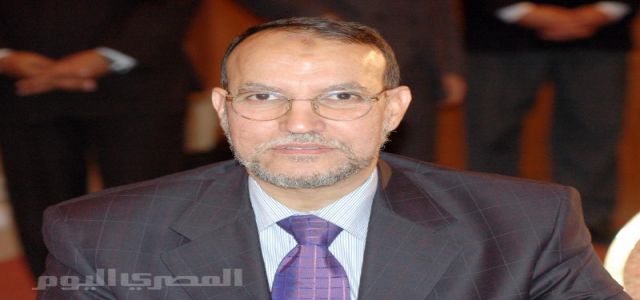|
|||||||||
| :: News > MB News | |||||||||

Interview with Essam al-Arian, member of the Muslim Brotherhood’s Executive Bureau
The Brotherhood announced that we will not have a candidate in the 2011 presidential election. We will wait for the names of the actual candidates and study their platforms before announcing our support for one candidate or lack of support for another.
|
|||||||||
| Thursday, June 24,2010 23:42 | |||||||||
|
|||||||||
|
What are the Brotherhood’s priorities regarding political participation, particularly after the election of the new Executive Council, which many had expected to focus more on internal organization?I think that what happened was the complete opposite of that was expected, for a number of reasons. We remained involved in national and pan-Arab issues, particularly the Palestine question, the threat to al-Aqsa, and the Gaza siege. We participated in the Shura Council midterm elections, with the same number of candidates we put forth in the last People’s Assembly elections. We continued our coordination with a number of political forces, opening up to them, visiting them and supporting some of their candidates in the Shura Council midterm elections. How will voter turnout affect the Brotherhood’s chances in the People’s Assembly elections?The average Egyptian participates only to defend his economic, social, and labor rights if he has been directly wronged. Accordingly, in the past two years we have seen a growing labor protest movement in front of the Shura and People’s Assembly. Unfortunately, the average Egyptian still does not make the connection between these economic, social, and employment problems and political reform. This economic protest movement is separated from political movements. We have seen hundreds or even at times thousands of workers demonstrating when their companies are liquidated and they do not get their rights, whereas we see no more than a small number of people at the political protests that we organize. How many candidates do you expect the Brotherhood to field in the upcoming elections?In the People’s Assembly, there will be 508 seats contested, including those allocated for women. If we continue at the same rate at which the Brotherhood has been participating, the number of candidates could increase to nearly 200, and there will be a large share for women in these elections. In the last [2005] elections, 165 Brotherhood members ran. This year, if we nominate 20-25 women, the number could increase to 190 or 200 candidates. Will the Brotherhood issue a new political platform before the People’s Assembly elections, and if so, how will it differ from the platform released in 2007?The platform issued in 2007 was a first draft of a political party platform, and was not an electoral platform. It was presented to the public, particularly the intellectual elite from across the political spectrum, in order to receive their feedback. There were some very heated discussions which the Brotherhood hosted, welcoming all the criticism aimed at them. The platform is still undergoing revision and has not yet been released in its final form, because it is linked to the revival of political life at large and the ability to have political parties that can survive and grow, particularly in a climate permitting the rotation of power. It would be pointless for people to request a political party or a party platform as long as parties exist in the barren political climate that we see now. What are the most important lessons the Brotherhood has learned from the experience of political participation since 2005?There are many lessons. We have been taking part in the elections since 1984, which is a quarter century, quite a long time. The main problem is the political stalemate in Egypt and the regime’s inability to undertake political reforms. The Egyptian regime, as a result of international pressure from the World Bank and the IMF, was forced to undertake very risky economic reforms. These led to social catastrophes, but the regime never gave in to any pressure for political reform. The People’s Assembly has very circumscribed powers and its ability to hold the government accountable is very limited. If there were free elections, there would need to be a constitutional amendment in order to rebalance parliamentary and executive powers. If parliament disagrees with the government, it is very easy to dissolve parliament, but it is difficult if not impossible to dismiss the government. This is a fundamental lesson: the rules of politics in Egypt must be changed by ending the state of emergency and allowing the freedom to form parties without limitations or conditions; allowing parliament to hold the government accountable; selecting the government from the parliamentary majority; and preventing electoral fraud. These are the fundamental rules for any political system and we believe that the Brotherhood’s ongoing participation will in the end push for real change. Will the Brotherhood nominate a candidate in the 2011 presidential election if the constitution is amended to facilitate independent candidacies?The Brotherhood announced that we will not have a candidate in the 2011 presidential election. We will wait for the names of the actual candidates and study their platforms before announcing our support for one candidate or lack of support for another. Arab Reform Bulletin Editor Michele Dunne conducted this interview in Cairo on May 31, 2010. Paul Wulfsberg translated the interview from Arabic. "This commentary is reprinted with permission from the Arab Reform Bulletin. Carnegie Endowment for International Peace." |
|||||||||
|
tags: El-Arian / Palestine / Shura / MB Candidates / ElBaradei / NDP / Emergency Law / Presidential Election / Reform / Tagammu / Daqahleya / Ghad / National Association for Change / Egyptian People / MB Parliamentary Bloc / Egyptian Regime / Human Rights Organizations
Posted in MB News , Interviews |
|||||||||
|
|||||||||
|
|
|||||||||
| Related Articles | |||||||||
|
|






